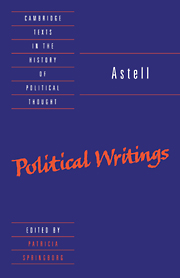Book contents
- Frontmatter
- Contents
- Acknowledgements
- Introduction
- Chronology of principal events in Mary Astell's life
- Bibliographic essay
- Select bibliography
- Reflections upon Marriage
- A Fair Way with the Dissenters and their Patrons
- An Impartial Enquiry into the Causes of Rebellion
- Biographical notes
- Index
- Cambridge Texts in the History of Political Thought
An Impartial Enquiry into the Causes of Rebellion
Published online by Cambridge University Press: 05 June 2012
- Frontmatter
- Contents
- Acknowledgements
- Introduction
- Chronology of principal events in Mary Astell's life
- Bibliographic essay
- Select bibliography
- Reflections upon Marriage
- A Fair Way with the Dissenters and their Patrons
- An Impartial Enquiry into the Causes of Rebellion
- Biographical notes
- Index
- Cambridge Texts in the History of Political Thought
Summary
Note on the Text
Astell's pamphlet is a reply to Bishop White Kennett's sermon, A Compassionate Enquiry into the Causes of the Civil War, preached on the anniversary of the death of Charles I, 31 January 1704. Kennett's sermon earned him notoriety for Whig tepidness on the merits of Charles, while Astell's reply is one of the famous set pieces of the Tory canon lamenting the death of the Royal Martyr, appealing to standard authorities, the Bible, the Earl of Clarendon and Henry Foulis, with broadsides in all directions.
Kennett is referred to by Astell as a writer in the Convocation Controversy who had assisted Archbishop Thomas Tenison to assert William's prerogative forbidding the convocation of the lower clergy in Parliament. Archbishop of Canterbury from 1694 to 1714, Tennison was William III's appointee and replacement for Archbishop William Sancroft, Astell's nonjuring friend. Sancroft and Edward Hyde, first Earl of Clarendon, the former Mary Astell's patron, the latter her intellectual mentor and much-cited source, were representative of the Anglican hierarchy of the 1680s, Laudian descendants uncompromising on the status and independence of Anglicanism. Astell, a firm supporter of the autonomy of the Anglican hierarchy, like her High Church authorities, represented what Goldie (1978, 64) has suggested to be the real roots of Tory constitutionalism in the revolt against James: the choice of church over king.
- Type
- Chapter
- Information
- Astell: Political Writings , pp. 129 - 198Publisher: Cambridge University PressPrint publication year: 1996

